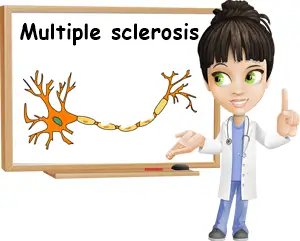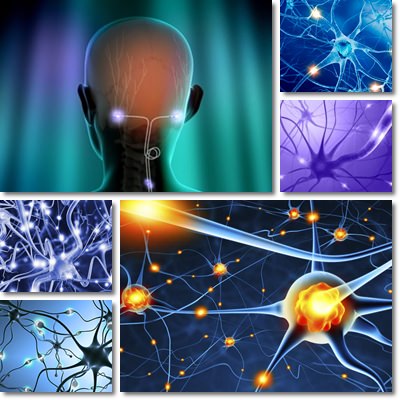Multiple sclerosis is an unforgiving disease that affects the central nervous system and causes the brain to slowly lose communication with the rest of the body, resulting in symptoms such as muscle weakness, difficulty walking, spasms, vision problems, fatigue, mood changes, speech problems, swallowing difficulties and pain. Ultimately, the progressive loss of muscle control leads to disability and death. It is estimated that the disease reduces life expectancy by around 10 years. Except for severe forms with a particularly rapid evolution, sufferers may reach old age (60 to 70 years old) and retain a moderate degree of autonomy.
What is multiple sclerosis?
MS or multiple sclerosis is a degenerative neurological disease, meaning it affects the nerves. What MS does is cause neurons (nerve cells) to gradually lose their protective fatty layer called the myelin sheath. The myelin sheath surrounds the tail of the nerve cell and helps conduct electrical impulses, allowing our brain to communicate information to the rest of our body and vice versa. When this protective fatty layer is damaged, nerve cells no longer transmit electrical impulses properly and the central nervous system cannot interact with the rest of the body accurately. Because of its degenerative nature, multiple sclerosis leads to the destruction of the myelin sheath of neurons, hence the progressive loss of muscle function as the disease evolves.

What does multiple sclerosis do?
Multiple sclerosis (MS) basically cuts off communication between the central nervous system made up of the brain, spine and optic nerves, and the rest of the body. This is a result of damage to the protective fatty layer covering the tail of our nerve cells. When this protective layer becomes damaged, neurons lose their ability to properly conduct electrical impulses. The more the disease progresses, the bigger the damage to the myelin sheath. Eventually, neurons lose their ability to conduct electrical impulses and information from the brain no longer reaches the rest of the body and vice versa. This is also the reason why twitching, numbness, pins and needles, muscle weakness and paralysis occur in multiple sclerosis.
Why is it called multiple sclerosis?
When the fatty myelin layer surrounding the tail of a neuron becomes thinner and risks exposing the nerve cell, a repair process is initiated (called remyelination). Basically, the same cells that created the protective layer in the first place attempt to repair it when it gets damaged. But this repair process doesn’t restore the myelin sheath completely and becomes less efficient as more damage occurs. This results in scarring of the nerve cells which takes the form of lesions or sclerae, hence the name multiple sclerosis. Imaging tests showing scars or lesions consistent with multiple sclerosis patterns may aid in diagnosing, although the disease is often recognizable through symptoms at this point in its progression.
- MS causes
- What causes multiple sclerosis?
The causes of multiple sclerosis are unknown. However, based on the progression of the disease and its effects, the following possible causes have been proposed:
Auto-immune disorder
Multiple sclerosis is characterized as an auto-immune disorder, meaning our own immune system attacks our nerve cells and causes damage to the myelin sheath that builds up and compromises nerve function, resulting in specific symptoms. Because it acts as an auto-immune condition, it has been theorized that the nerve damage is caused by an auto-immune reaction. This presupposed auto-immune reaction has not been identified yet, but researchers believe that either the immune system attacks nerve cells, causing damage to the myelin sheath that compromises the conduction of electrical impulses, or there is a dysfunction of the cells that produce myelin. When the myelin sheath surrounding the tail of nerve cells gets damaged, an inflammatory reaction occurs. Inflammation is also characteristic of auto-immune conditions and its presence further reinforces the theory that multiple sclerosis may be caused by an auto-immune reaction.

Infection
It has been theorized that multiple sclerosis can be caused by viral or bacterial infections. Over 90% of multiple sclerosis sufferers have bands of antibodies called immunoglobulins in the brain and spine fluid. These usually indicate the presence of an infectious agent to which the immune system has responded. These findings appear to indicate that an unknown or known, but unidentified virus or bacteria may trigger the onset of the disease. The theory is supported by the ability of some viruses to cause demyelination, or damage to the protective fatty myelin layer covering the tail of nerve cells.
Geographical causes
Research shows an increase in multiple sclerosis cases in people living further from the equator, although exceptions exist. Northern Europeans, for example, appear to have a higher incidence of multiple sclerosis. Moreover, the disease appears to have an earlier onset in sufferers living in countries with little sunshine and cooler climates. The main identifiable risk factor would appear to be the lack of sufficient sunshine resulting in a low production of vitamin D, a nutrient with a crucial influence on immunity. Although just a theory at this point, it may be that a chronic vitamin D deficiency may result in various immune system dysfunctions that may encourage the development of multiple sclerosis.
Parasites
Just as bacteria and viruses may cause infections that lead to the demyelination of nerve cells, it is possible for certain parasites to have the same effects and produce this type of nerve damage. After all, intestinal parasites can produce the wildest of symptoms and cause the most diverse of diseases. This theory may be supported by the geographical risks associated with the condition: certain parasites are more likely to exist in larger numbers in certain regions or climates, meaning infection risks will be higher in populations from certain areas of the world. However, this is but speculation because there is currently no test that can identify parasites as a cause for multiple sclerosis.
Genetics
Individuals with close family members affected by multiple sclerosis have a higher risk of developing the disease themselves. This is believed to be a result of the presence of certain genes that create a predisposition for the condition. However, at this point, it cannot be said that multiple sclerosis is a hereditary disease.
Poor hygiene
Poor hygiene is actually more of a risk than a cause. If we don’t enjoy an overall good hygiene, we are more likely to get exposed to various infectious agents such as viruses, bacteria or parasites which may cause various disease, including nerve damage consistent with multiple sclerosis.
Stress, alcohol consumption and smoking
There have been voices that have advanced the theory that smoking and stress may represent risk factors for multiple sclerosis, but there no conclusive evidence at this point, except for the fact that stress can cause the onset of symptoms, triggering episodes. Alcohol consumption however has been shown to cause nerve damage in the form of demyelination (nerve cells losing their protective myelin sheath). It is thus possible that chronic alcohol consumption may represent a risk factor for multiple sclerosis, although the exact mechanism has not been identified yet.
Signs and symptoms
One of the reasons it is difficult to diagnose multiple sclerosis is because of the variety of symptoms it exhibits. The condition may affect both physical and mental health and cause various dysfunctions all over the body. One’s muscles, breathing, swallowing, vision, disposition or reflexes may be affected. The evolution of symptoms may differ from patient to patient: some may experience a progressive worsening of symptoms, while others may experience episodes of worsening of symptoms followed by periods of improvement.
By its very nature, multiple sclerosis is a degenerative disease, meaning nerve damage will continue to progress. Unfortunately, further research is needed to confirm any of the potential causes of the condition and set the course for an effective treatment. At this point, symptom management is the best course of action and can be done with the help of medication meant to control the severity of the disease and improve the quality of life of sufferers. Other possible solutions are not yet approved by medical professionals and considered ineffective.
